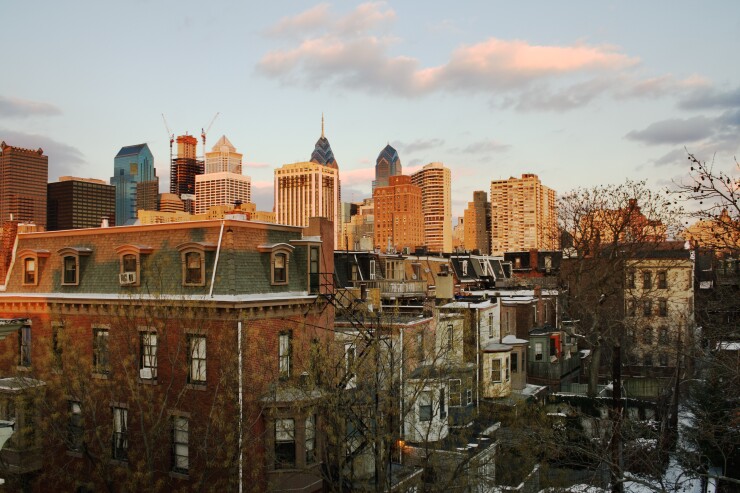Prices paid for vacant land in Philadelphia have plummeted to their lowest levels in three years after peaking in 2017, an indication that the city's development boom led by townhouse, condo and apartment projects is losing steam.
Buyers of bare development sites paid a median price of $31.72 a square foot during the first six months of 2018, down more than 46% from last year's $59.23, according to public data compiled this month at the Inquirer's and Daily News' request by Kevin Gillen, senior research fellow at Drexel University's Lindy Institute for Urban Innovation.
The January-to-June prices were the lowest since 2015, when land sold at a median of $26.94 a square foot for the year. The decline comes as apartment landlords face a surge in supply that's already starting to tamp down rents, while homebuyers tighten their purse strings in the face of increasing interest rates and other headwinds, Gillen said.

"We've seen a significant run-up in land prices during the recent development boom, and many parcels have priced themselves beyond what could feasibly be developed on them," he said. "We're seeing a correction."
Last year's median vacant land price, calculated from Philadelphia Recorder of Deeds and Office of Property Assessment records, was the city's highest since at least 2000, the year of Gillen's earliest tally.
Land prices climbed alongside a steady increase in rents and home prices, as new residents flocked to revitalizing neighborhoods in and around Center City, helping fuel a decade-long growth spurt for the city after a half-century of population losses.
But this year's declines, coming amid other data that show faltering rents and home prices in the city, could mean that Philadelphia's boom days are due for a break, Gillen said.
"Land prices and sales tend to be a leading indicator of real estate markets," he said. "Since the consensus is that our housing market is at or near its peak, it makes sense that land prices would begin softening before house prices."
Another bearish signal is the decline in so-called blanket sales, in which a buyer acquires a bundle of properties for a single price, from 17.4% of all vacant land deals during the first six months of 2017 to 13.9% during the first six months of 2018. Because such transactions are common when big tracts are being assembled for major developments, the dip "indicates a likely reduction in the number of large projects entering the development pipeline," Gillen said.
Gary Jonas, who has built townhouses and apartment buildings in Northern Liberties, Graduate Hospital, Mantua and other parts of the city as a principal with How Properties, said sellers are only beginning to understand that developers like him no longer expect returns that can justify prices they were paying for land as recently as a year ago.
"People are still trying to get last year's pricing, and they're not getting it," he said. "Prices are definitely going down."
Among apartments, average rents paid for units in the city's newest and best-located "Class A" buildings slid 3.7% to an effective $2,234 a month during the three months that ended June 30 from last year, according to data from Washington-based market tracker Delta Associates. Those average rents are only 0.3% above their levels in 2013, when the current spate of development was just getting underway, according to Delta.
This year's lagging rents correspond with a surge of new rental units hitting the market in the city, resulting in fierce competition among landlords for tenants. During the January-to-June period, Philadelphia averaged 9,369 Class A units, compared with 8,527 in 2017 and 3,929 in 2013, Delta said.
"Increased construction may restrain rent growth and continue to push up vacancy rates in the near term," Delta analysts led by the firm's president William Rich wrote in a July report.
For-sale homes, meanwhile, don't appear to be faring much better, with average citywide house prices rising just 0.9% during the three months to June 30 over the same period last year, Gillen said in an August report. That's the lowest increase since the market began recovering in 2012 from the last recession, he wrote.
That sluggishness corresponds with a gradual upward creep in interest rates that's curtailing what homebuyers can afford. Between the start of April and the end of June, the rate on a 30-year fixed-interest mortgage averaged 4.54%, up from 3.98% during the year-ago period, according to data from the Federal Reserve Bank of St. Louis.
Those rates have since crept higher, averaging 4.9% for the week that ended Oct. 11, and are expected to continue rising as the Federal Reserve takes steps to tighten monetary policy.
In light of such headwinds, which also include rising construction costs, it's not surprising that developers would be insisting on — and getting — more favorable pricing from land sellers, said Michael Silverman, a senior vice president with real estate services firm Newmark Knight Frank's valuation practice in Philadelphia.
Even those developers who remain bullish on the market may be held back by increasingly skittish banks whom they rely on for acquisition and construction loans, Silverman said.
"Because of inventory levels being of concern to lenders and to the market as a whole, buyers of these sites are taking another look at the pricing that has occurred over the last year," he said.




